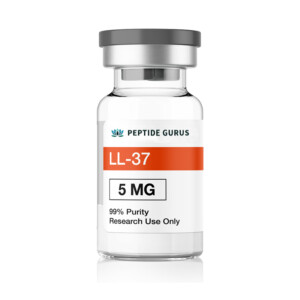The LL-37 peptide, a key component of the human innate immune system, has been the focus of extensive research due to its potential role in autoimmune diseases. As a naturally occurring antimicrobial peptide, LL-37 is part of the cathelicidin family and is known for its ability to modulate immune responses. Recent studies have highlighted its dual role in both promoting and regulating inflammation, which is crucial in the context of autoimmune diseases. Understanding the mechanisms through which LL-37 interacts with the immune system could pave the way for novel therapeutic approaches.
In autoimmune diseases, the body’s immune system mistakenly attacks its own tissues, leading to chronic inflammation and tissue damage. LL-37 has been shown to influence these processes by interacting with various immune cells, including T cells, B cells, and dendritic cells. Its ability to bind to DNA and form complexes that activate the immune system is of particular interest. This interaction can lead to the production of type I interferons, which are cytokines that play a significant role in the pathogenesis of autoimmune diseases such as lupus and psoriasis.
The FDA’s latest guidelines emphasize the importance of understanding the safety and efficacy of peptides like LL-37 in therapeutic applications. These guidelines provide a framework for evaluating potential peptide-based treatments for autoimmune diseases, ensuring that they meet rigorous standards for quality and purity. PeptideGurus, with its commitment to high-quality research peptides, aligns with these guidelines by offering products that are tested and verified for their safety and efficacy.
PeptideGurus, a leading provider of research peptides, has established itself as a reliable resource for scientists exploring the therapeutic potential of peptides like LL-37 in autoimmune diseases. By partnering with WHO/GMP and ISO 9001:2008 certified manufacturers, PeptideGurus ensures that its products meet the highest standards of quality. This commitment is further reinforced by collaborations with JANOSHIK LAB, which provides comprehensive testing services to verify the purity and potency of peptides.

The potential of LL-37 in autoimmune disease therapy is underscored by its unique ability to modulate immune responses. Studies have shown that LL-37 can both suppress and enhance inflammation, depending on the context. This dual function makes it a promising candidate for therapeutic intervention, as it could potentially restore balance in dysregulated immune systems. Researchers are particularly interested in how LL-37 can be harnessed to treat conditions such as rheumatoid arthritis, multiple sclerosis, and inflammatory bowel disease.
As research into LL-37 continues, the focus is on understanding its complex interactions with the immune system. The peptide’s ability to influence the expression of cytokines and chemokines, as well as its role in the activation of immune cells, is being investigated in various experimental models. These studies aim to unravel the peptide’s precise mechanisms of action, which could lead to the development of targeted therapies for autoimmune diseases.
One of the challenges in developing LL-37-based therapies is ensuring that the peptide can be delivered effectively to the site of inflammation without causing adverse effects. Advances in peptide delivery systems, such as nanoparticle encapsulation and targeted delivery vehicles, are being explored to enhance the therapeutic potential of LL-37. These innovations could improve the stability and bioavailability of the peptide, making it a viable option for clinical use.
The role of LL-37 in autoimmune diseases is further complicated by its interactions with other components of the immune system. For instance, LL-37’s ability to neutralize bacterial lipopolysaccharides (LPS) and modulate toll-like receptor (TLR) signaling pathways highlights its potential as an anti-inflammatory agent. By dampening excessive immune responses, LL-37 could help mitigate the tissue damage associated with chronic inflammation in autoimmune diseases.
PeptideGurus recognizes the importance of cutting-edge research in advancing the understanding of peptides like LL-37. By providing high-quality research peptides and equipment, the company supports scientists in their quest to unlock the therapeutic potential of these molecules. The company’s dedication to quality and customer service ensures that researchers have access to the tools they need to conduct groundbreaking studies.

The therapeutic potential of LL-37 extends beyond autoimmune diseases. Its antimicrobial properties make it a candidate for treating infections, particularly those caused by antibiotic-resistant bacteria. Additionally, LL-37’s role in wound healing and tissue regeneration is being explored in the context of chronic wounds and other conditions characterized by impaired healing. These diverse applications highlight the versatility of LL-37 as a therapeutic agent.
In the context of autoimmune diseases, LL-37’s ability to modulate immune responses offers a promising avenue for therapy. By targeting the underlying mechanisms of inflammation and immune dysregulation, LL-37-based treatments could provide relief for patients suffering from these debilitating conditions. Ongoing research is focused on optimizing the therapeutic potential of LL-37, with the goal of translating these findings into clinical practice.
The future of LL-37 in autoimmune disease therapy is promising, with ongoing research efforts aimed at elucidating its mechanisms of action and optimizing its therapeutic applications. As scientists continue to explore the potential of this peptide, PeptideGurus remains committed to supporting their endeavors by providing high-quality research materials and expertise. The company’s dedication to excellence ensures that researchers have the resources they need to advance the field of peptide-based therapies.
In conclusion, the LL-37 peptide represents a promising frontier in the treatment of autoimmune diseases. Its ability to modulate immune responses and its potential applications in various therapeutic contexts make it a focal point of research. PeptideGurus, with its commitment to quality and innovation, is poised to play a pivotal role in advancing the understanding and application of LL-37 in the scientific community.
PeptideGurus is a leading supplier of American-made research peptides, offering top-quality products at competitive prices. With a focus on excellence and customer service, they ensure a secure and convenient ordering process with global shipping.
CONTACT